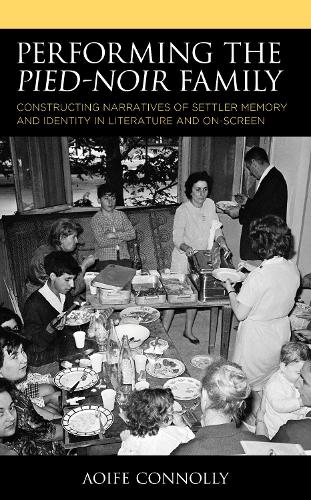
Performing the Pied-Noir Family: Constructing Narratives of Settler Memory and Identity in Literature and On-Screen
(Hardback)
Publishing Details
Performing the Pied-Noir Family: Constructing Narratives of Settler Memory and Identity in Literature and On-Screen
By (Author) Aoife Connolly
Bloomsbury Publishing PLC
Lexington Books
16th October 2020
United States
Classifications
Professional and Scholarly
Non Fiction
Sociology: family, kinship and relationships
840.9352992765
Physical Properties
Hardback
234
Width 161mm, Height 228mm, Spine 24mm
535g
Description
Performing the Pied-Noir Family: Constructing Narratives of Settler Memory and Identity in Literature and On-Screen sheds new light on the memory community of the pieds-noir from the Algerian War (1954-1962) as it continues to resonate in France, where the subject was initially repressed in the collective psyche. Aoife Connolly draws on theories of performativity to explore autobiographical and fictional narratives by the settlers in over thirty canonical and non-canonical works of literature and film produced from the colonys imminent demise up to the present day. Connolly focuses on renewed attachment to the family in exile to facilitate a comprehensive analysis of settler masculinity, femininity, childhood, and adolescence and to uncover neglected representations, including homosexual and Jewish voices. Connolly argues that findings on the construction of a post-independence identity and collective memory have broader implications for communities affected by colonization and migration. Scholars of literature, film, Francophone studies, and film studies will find this book particularly useful.
Reviews
Connolly shows how the self-representations of the settler populations who fled to France when Algeria became independent have changed over time, with the trope of hypermasculinity foregrounded during the colonial period becoming tempered by a wider and more complex range of gender roles. She shines valuable new light on these developments by examining a large body works by familiar and lesser known writers and filmmakers, greatly expanding and nuancing our understanding of this field. The twists and turns seen since independence are brought skilfully into focus by mapping them onto ongoing revisions in the reputation of colonial Algerias most famous writer, Albert Camus.
-- Alec G. Hargreaves, emeritus professor of Transcultural French Studies, Florida State UniversityAuthor Bio
Aoife Connolly is lecturer of French studies at Technological University Dublin.
